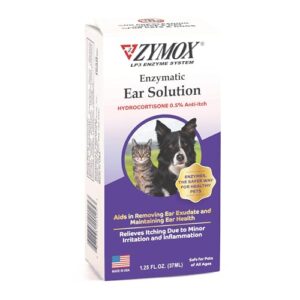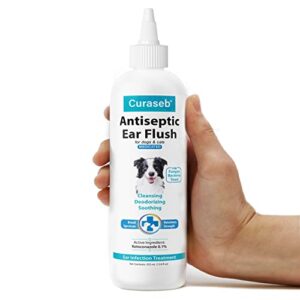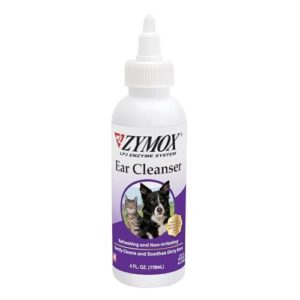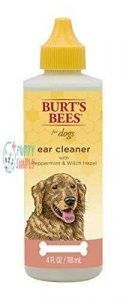This site is supported by our readers. We may earn a commission, at no cost to you, if you purchase through links.

Several dog ear infection home remedies can provide relief right from your kitchen cabinet. Apple cider vinegar mixed with water creates a gentle cleaning solution that helps restore your dog’s ear pH balance.
Coconut oil works as a natural antibacterial agent, while witch hazel reduces inflammation effectively. You can also try a cooled green tea rinse or a few drops of olive oil for cleaning.
However, these remedies work best for mild infections. Severe symptoms like intense scratching, head shaking, or foul odors require professional attention to prevent complications that could affect your dog’s hearing and balance.
Table Of Contents
- Key Takeaways
- Dog Ear Infection Symptoms
- Causes of Dog Ear Infections
- Natural Remedies for Ear Infections
- 6 Best Dog Ear Infection Home Remedies
- Cleaning and Caring for Infected Ears
- Preventing Dog Ear Infections
- When to Seek Veterinary Care
- Frequently Asked Questions (FAQs)
- How do I treat my dog’s ear infection from home?
- What to do if your dog has an ear infection but can’t afford a vet?
- What to flush an infected dog’s ear with?
- Can home remedies replace veterinary treatment completely?
- How long do home remedies take to work?
- Are home remedies safe for puppies and seniors?
- Which dog breeds get ear infections most often?
- Can ear infections spread between dogs in households?
- Conclusion
Key Takeaways
- Start with gentle home remedies – You can try diluted apple cider vinegar, coconut oil, or witch hazel for mild infections, but watch your dog closely for any worsening symptoms.
- Don’t delay professional care – If you notice severe symptoms like bloody discharge, balance problems, or intense pain, you’ll need veterinary attention to prevent permanent hearing damage.
- Prevention beats treatment – You’ll save time and money by cleaning your dog’s ears weekly, especially if they have floppy ears that trap moisture and debris.
- Know when home remedies aren’t enough – If symptoms persist or worsen after 3-7 days of consistent home treatment, you’ll need professional diagnosis and treatment to avoid complications.
Dog Ear Infection Symptoms
Recognizing ear infection symptoms early helps you address the problem before it becomes serious and causes lasting damage to your dog’s hearing.
You’ll notice specific behavioral changes and physical signs that clearly indicate when your furry friend needs immediate attention for their uncomfortable ears.
Behavioral Signs of Ear Infections
Watch for your dog’s head shaking and persistent ear scratching—these are telltale dog ear infection symptoms.
You might notice your furry friend tilting their head or whimpering when you touch their ears.
Balance issues can develop, making your pup seem unsteady, and some dogs show vocalization changes or appetite changes when dealing with ear discomfort.
Physical Indicators of Ear Infections
Beyond behavioral changes, you’ll notice clear physical signs when your dog develops an ear infection.
Look for dark-colored ear discharge that may appear brown, gray, white, or green.
A strong, unpleasant ear odor often accompanies this discharge.
You might see visible wounds, scabs, or crusted skin inside the ear canal.
Watch for skin changes like redness or swelling around the ear area, plus hair loss near the infected ear from excessive scratching.
Be aware that changes in coat condition can also indicate a broader health issue.
Disruption to Balance and Coordination
Inner ear infections can throw your dog’s world off balance, literally affecting their ability to walk straight.
When otitis interna strikes, it can cause neurological damage that disrupts your pet’s equilibrium system.
Watch for these warning signs:
- Head tilting that persists or looks unusual
- Walking difficulty with stumbling or circling motions
- Loss of equilibrium causing your dog to lean or fall.
These ear infection complications shouldn’t be ignored—they can lead to hearing loss or even facial paralysis if the ear drum becomes severely damaged.
Causes of Dog Ear Infections
Understanding what causes ear infections helps you recognize risk factors and take steps to protect your dog’s ears. Several common triggers can lead to painful infections that require prompt attention.
Water Trapped in The Ear Canal
Moisture breeds bacteria and yeast, creating perfect conditions for painful ear infections.
Many dogs develop ear infections when moisture breeds bacteria and yeast in their ear canals.
Swimming, baths, or humid weather can trap water inside, creating perfect conditions for dog ear infection.
Breeds with floppy ears face higher breed predisposition risks.
Preventing water entry during baths and thorough post-swim care with proper ear drying techniques protects your dog’s ear canal health, which is crucial for preventing dog ear infection and maintaining overall ear canal health.
Foreign Objects and Mites
Foreign objects and ear mites create irritation that breaks down your dog’s natural ear defenses.
These intruders damage delicate ear canal skin, opening pathways for bacterial and yeast infections.
Identifying Foreign Objects and Mite Infestation Signs:
- Dark, coffee-ground discharge – classic ear mites symptom
- Excessive head shaking – your dog’s attempt at Removing Foreign Objects
- Intense scratching – beyond normal grooming behavior
- Visible debris or objects – grass seeds, dirt, or tiny moving specks
- Strong, musty odor – different from typical ear infection smells
Preventing Mite Exposure involves regular ear checks and avoiding areas with high mite populations.
Ear mites, or Otodectes cynotis, are highly contagious arachnids that infest dogs’ ear canals.
However, Veterinary Mite Treatment remains the most effective solution for confirmed infestations.
Chronic Ear Infections and Systemic Issues
Sometimes chronic ear infections signal deeper systemic problems that need attention.
Food allergies and environmental allergies can trigger immune responses that create ongoing dermatologic symptoms, including persistent ear issues.
Certain breeds show predisposition to these conditions due to their genetics. Without proper allergy management addressing dietary influence and environmental factors, you’ll likely see long-term effects that make simple home remedies ineffective.
Natural Remedies for Ear Infections
When your dog’s ears are causing discomfort, natural remedies can provide gentle relief while you monitor their condition.
These time-tested solutions work best for mild infections, but you’ll want to watch closely for any worsening symptoms.
Apple Cider Vinegar for Ear Infections
Apple cider vinegar offers antimicrobial properties that can help combat bacterial and fungal infection types.
Create your ACV dilution by mixing equal parts raw apple cider vinegar with water. This ear infection home remedy requires careful application methods and consistent treatment duration.
The antimicrobial properties of the vinegar may help.
Key considerations for this dog ear infection remedy:
- Proper dilution prevents irritation – Never use undiluted ACV as it can burn sensitive ear tissue
- Limited effectiveness – Works best for mild yeast infections, not severe bacterial cases
- Monitor for potential risks – Stop immediately if redness or pain increases during ear infection treatment
Coconut Oil for Ear Infections
Coconut oil offers natural antibacterial and antifungal properties that fight ear infections effectively.
You can apply warm coconut oil directly to your dog’s ear canal using a clean dropper.
This dog ear infection remedy soothes irritated skin while removing debris.
Coconut oil’s benefits extend to softening and removing stubborn earwax buildup.
| Coconut Oil Benefits | Application Details |
|---|---|
| Fights bacteria and fungi | Warm slightly before use |
| Moisturizes dry, irritated ears | Apply 2-3 drops with dropper |
| Removes built-up earwax | Massage ear base gently |
| Soothes inflammation naturally | Use twice daily until symptoms clear |
| Safe alternative to harsh chemicals | Monitor for any adverse reactions |
Always consult your vet before starting any ear infection home remedy treatment.
Witch Hazel for Ear Infections
Witch hazel offers natural astringent properties that can help dry your dog’s ear canal and reduce inflammation.
This gentle remedy works well for mild ear infections when properly diluted and applied correctly.
Here’s how to use witch hazel safely:
- Dilute properly: Mix equal parts witch hazel with water to prevent excessive drying
- Apply gently: Use a cotton ball, never pour directly into the ear canal
- Monitor closely: Watch for increased irritation or worsening symptoms
- Limit frequency: Use once daily maximum to avoid over-drying sensitive ear tissue
- Consult first: Check with your vet before starting any home treatment plan
Remember that witch hazel works best for surface-level issues. If your dog’s ear infection persists or seems severe, professional veterinary care remains your safest bet for proper diagnosis and treatment.
6 Best Dog Ear Infection Home Remedies
When your dog’s ears need extra help, the right products can make all the difference between ongoing discomfort and quick relief.
These six vet-recommended solutions combine natural ingredients with proven effectiveness to tackle ear infections safely at home.
1. ZYMOX Ear Solution for Dogs Cats

ZYMOX’s enzyme-based ear solution offers a gentle alternative to harsh antibiotics for treating your dog’s ear infections.
This veterinarian-recommended formula contains 0.5% hydrocortisone to soothe itchy, irritated ears while its LP3 enzyme system targets harmful bacteria and yeast.
You’ll appreciate that no pre-cleaning is required—simply fill the ear canal and let the solution work its magic.
Most pet owners see improvement within 3-7 days of consistent use.
Regular use can also prevent future ear issues.
Best For: Pet owners looking for a gentle, vet-recommended at-home solution for dogs or cats with ear infections, irritation, or recurring ear issues.
- Small bottle size and higher price point compared to other products.
- Requires consistent use for best preventative results.
- Not a full substitute for vet care in severe or persistent cases.
- No pre-cleaning required; easy application with visible results in 3-7 days.
- Contains hydrocortisone to relieve itching and the LP3 enzyme system to fight infection.
- Works as both a treatment and a preventive care option for long-term ear health.
2. Curaseb Dog Ear Infection Treatment

When your dog’s ears need serious attention, Curaseb steps up as a trusted ally.
This vet-formulated treatment tackles infections head-on, targeting unwanted foreign visitors while gently cleansing outer ear flaps.
It flushes away stubborn wax, dirt, and debris that can harbor bacteria, and the advanced formula soothes irritated skin and deodorizes, leaving ears fresh and comfortable.
Available in both 12oz solution and convenient 100-count wipes, it adapts to your cleaning routine seamlessly.
Best For: Pet owners seeking a vet-trusted, thorough ear cleaner to relieve itching, irritation, and infection in dogs and cats.
- Effectively removes wax, dirt, and odor, promoting healthy, comfortable ears.
- Vet-formulated with antifungal properties for relief from infections and irritation.
- Available in both a 12oz solution and easy-to-use wipes for flexible cleaning.
- Pets may experience vomiting if they lick the product after use.
- Requires careful application and post-cleaning wipe to prevent ingestion.
- Not all users report noticeable improvements in ear health.
3. EcoEars Natural Dog Ear Cleaner

For pet parents seeking a gentler approach, EcoEars Natural Dog Ear Cleaner offers a pharmaceutical-free solution that’s safe for sensitive ears.
This all-natural formula combines mullein leaf extract, witch hazel, and rosemary to tackle fungal, bacterial, and yeast infections without harsh chemicals.
You’ll see results in 7-10 days, and it’s gentle enough for weekly maintenance. Simply squirt once or twice into your dog’s ear canal and massage gently at the base, using this all-natural formula.
Best For: Pet parents looking for a gentle, natural ear cleaner that’s safe for dogs with sensitive ears or chronic ear issues.
- All-natural, pharmaceutical-free formula safe for regular use
- Effectively relieves itch, smell, and gunk caused by infections
- Easy application with fast results in 7-10 days
- Not suitable for cats or puppies under 12 weeks
- May require patient introduction if your dog resists ear cleaning
- Does not address itchy paws—requires additional product for those issues
4. Virbac Epi Otic Ear Cleanser

Veterinarians frequently recommend this trusted ear cleanser for its gentle yet effective formula.
The neutral pH solution contains salicylic acid and patented anti-odor technology that removes debris and excess wax without irritating sensitive ears.
You’ll find it works well for routine maintenance and managing chronic ear issues.
Simply shake the bottle, pour into your dog’s ear canal, massage gently, and let them shake it out.
Many pet owners notice reduced scratching and head-shaking within days of use, which can be a significant improvement for dogs with chronic ear issues, and this can lead to a better quality of life with reduced scratching.
Best For: Dogs and cats of all ages, especially those with sensitive, irritated, or allergy-prone ears, and pets prone to chronic ear issues.
- Gentle, non-irritating formula safe for routine use on sensitive skin.
- Effectively removes debris, reduces odor, and helps prevent ear infections.
- Quick results with reduced scratching and head-shaking, especially in breeds with floppy ears.
- Not a treatment for active ear infections; meant for prevention and maintenance.
- Some pets may dislike the liquid application process or sensation.
- Overuse or excessive fluid can create mess or discomfort if not applied as directed.
5. Zymox Ear Cleanser for Pets

Your furry friend deserves the best care when dealing with ear troubles.
ZYMOX Ear Cleanser uses a patented LP3 enzyme system that naturally breaks down ear debris and wax buildup.
This gentle, non-toxic formula works for dogs, cats, and small animals of all ages.
Simply fill the ear canal, massage gently, and let your pet shake out the solution.
The enzymes do the heavy lifting while keeping ears fresh and healthy.
Best For: Pet owners wanting a gentle, effective way to clean and maintain the ear health of dogs, cats, or small animals, especially those with sensitive ears or prone to infections.
- Gentle, non-toxic, and non-irritating formula safe for pets of all ages
- Effectively cleans ears, reduces itchiness, and helps prevent infections
- Highly rated by veterinarians and users for ease of use and long-term results
- Not suitable for treating active ear infections needing antibiotics
- Some users report issues with packaging and dispenser quality
- Odor may be strong for sensitive owners and pets
6. Burt’s Bees Dog Ear Cleaner

Made with natural ingredients, Burt’s Bees Dog Ear Cleaner offers a gentle yet effective solution for maintaining your dog’s ear health.
This pH-balanced formula contains witch hazel and peppermint to cleanse and soothe irritated ears while removing excess moisture.
You’ll appreciate that it’s free from harsh chemicals and comes in eco-friendly packaging.
Simply apply 24 drops at the ear canal entrance and massage gently twice weekly, which is a procedure that utilizes natural ingredients.
Your dog might shake their head afterward, which is perfectly normal behavior.
Best For: Dogs (including puppies) with sensitive ears, recurring ear issues, or owners seeking a natural, eco-friendly ear cleaner.
- Gently cleans and soothes ears with natural ingredients like witch hazel and peppermint.
- Free from harsh chemicals, suitable for sensitive ears and regular use.
- Eco-conscious packaging made from 80% post-consumer recycled materials.
- Some dogs may resist application due to the scent or sensation.
- Bottle size may be smaller than expected.
- Requires consistent use for best results in chronic cases.
Cleaning and Caring for Infected Ears
Once you’ve identified an ear infection, proper cleaning becomes essential for your dog’s recovery and comfort.
The right technique can help flush out debris, deliver medication effectively, and prevent the infection from worsening.
Flushing The Ear Canal With Warm Solution
Warm up your dog ear cleaning solution to body temperature before getting started.
Use a bulb syringe to gently flush the ear canal, helping debris removal without causing discomfort. The solution temperature should feel lukewarm on your wrist.
This flushing technique prepares the ear for natural treatments and makes certain thorough cleaning of the infected area.
Many pet owners utilize a specialized cleaning tool for this ear cleaning process, which is an essential part of maintaining your dog’s ear health and preventing infected area issues.
Massaging The Base of The Ear
After applying cleaning solution, massage the base of your dog’s ear in gentle circular motions.
This technique helps medication absorption while providing comfort.
Apply steady but light pressure – think of kneading bread dough rather than deep tissue work.
The massage benefits include distributing treatment throughout the ear canal and loosening stubborn debris for easier removal.
Applying Natural Treatments and Medications
After massaging, apply your chosen natural remedies or medications using proper application techniques.
Use a cotton ball to distribute apple cider vinegar, coconut oil, or prescribed treatments to the ear’s inner surface.
Follow dosage precision guidelines from your vet, complete the full treatment duration even if symptoms improve, and store medications properly.
Remember that dietary changes for ear health can also play a role in recovery. Monitor for side effects during home remedies for dogs.
Preventing Dog Ear Infections
The best way to prevent ear infections is through regular maintenance and smart habits.
You can protect your dog’s ears by establishing a consistent cleaning routine, avoiding harmful substances, and staying alert to early warning signs.
This approach allows for regular maintenance and helps prevent complications.
Regular Ear Cleaning and Maintenance
Think of ear cleaning frequency like brushing your teeth—consistency prevents problems.
Weekly cleaning with proper techniques keeps your dog’s ears healthy and reduces ear infection risk.
Here’s your essential ear hygiene routine:
- Cleaning frequency: Clean weekly for most dogs, daily for breeds with floppy ears or hair removal needs
- Proper techniques: Use vet-approved ear cleaning products, massage gently, and let your dog shake out debris
- Product selection: Choose pH-balanced cleaners designed for dog ear care—avoid human products that disrupt natural ear chemistry
Avoiding Harsh Chemicals and Substances
Skip harsh chemicals like alcohol, hydrogen peroxide, and chlorhexidine when treating dog ear infections.
These substances can irritate sensitive ear tissue and worsen inflammation. Instead, choose safe alternatives with natural ingredients like apple cider vinegar or gentle cleansers.
Avoid tea tree oil despite DIY solutions recommending it—it’s toxic to dogs. Natural ear cleaners offer effective options for home remedies.
Monitoring for Signs of Infection
Check your dog’s ears weekly for early detection of problems.
Watch for behavioral changes like head shaking or scratching.
Look for ear redness, unusual discharge appearance, and odor changes.
Fresh dog ear infection symptoms develop quickly, so regular symptom tracking helps catch ear infection signs before they worsen.
Spotting these dog ear symptoms early prevents serious complications, and regular checks are crucial for fresh dog ear infection symptoms to be identified quickly.
When to Seek Veterinary Care
While home remedies can help with mild ear infections, you’ll need professional veterinary care when symptoms persist or worsen despite treatment.
Signs like severe pain, bloody discharge, loss of balance, or hearing changes require immediate attention to prevent permanent damage.
Severe Symptoms and Complications
Red flags signal it’s time for professional help.
Don’t wait when your dog shows serious ear infection warning signs—act fast to prevent lasting damage.
Severe ear infection complications include hearing loss, neurological damage from inner ear involvement, and chronic pain that won’t subside.
Watch for facial paralysis, signs of eardrum rupture like bloody discharge, or balance problems.
These serious complications require immediate veterinary attention to prevent permanent damage.
Ineffective Home Remedies and Treatment
You’ll know home remedies aren’t working when symptoms persist or worsen after several days.
Some treatments can actually harm your dog’s ears, making professional care necessary.
Here are warning signs your DIY approach isn’t cutting it:
- Tea tree toxicity and peroxide dangers – these substances can damage ear tissue
- Vinegar concerns and olive oil risks – may worsen infections by trapping moisture
- Ignoring vets when dog ear infection symptoms escalate beyond basic home remedies for dogs
Hydrogen peroxide and tea tree oil should never replace proper ear infection treatment.
Importance of Accurate Diagnosis and Professional Help
Professional veterinary care guarantees accurate ear infection diagnosis and prevents serious complications.
Your vet can identify underlying causes that home remedies can’t address, like allergies or structural issues.
Without proper veterinary assistance, untreated risks include permanent hearing loss and neurological damage.
Professional expertise protects your dog’s long-term health through targeted treatment plans and prevents complications such as permanent hearing loss.
Frequently Asked Questions (FAQs)
How do I treat my dog’s ear infection from home?
You can use diluted apple cider vinegar or coconut oil to clean your dog’s ears, but serious infections need veterinary attention to prevent permanent hearing damage.
What to do if your dog has an ear infection but can’t afford a vet?
Start with gentle cleaning using diluted apple cider vinegar or coconut oil.
Monitor closely for worsening symptoms and seek low-cost veterinary clinics or payment plans if condition doesn’t improve within days.
What to flush an infected dog’s ear with?
Like Goldilocks seeking the perfect porridge, you’ll want diluted apple cider vinegar (1:1 with water) for yeast infections.
This solution is preferred for its gentle effect, and it should be used instead of other harsher alternatives.
Avoid hydrogen peroxide—it’s too harsh and promotes bacterial growth.
Can home remedies replace veterinary treatment completely?
Home remedies can’t fully replace veterinary care for dog ear infections.
While they may provide temporary relief, infections rarely resolve without proper medical treatment and can cause permanent hearing damage if left untreated.
Infections require proper medical attention to prevent long-term damage.
How long do home remedies take to work?
Ironically, patience becomes your greatest enemy when you’re anxious for relief.
But most home remedies need 3-7 days of consistent application to show improvement, with full healing taking up to two weeks.
Are home remedies safe for puppies and seniors?
Exercise caution with puppies and seniors—their delicate systems handle home remedies differently.
Diluted solutions work better, but you’ll want your vet’s approval first since their immune systems need extra care.
Which dog breeds get ear infections most often?
Dogs with floppy ears are like umbrellas in a storm – they trap moisture and create perfect breeding grounds for infections.
Basset Hounds, Cocker Spaniels, Labrador Retrievers, and other droopy-eared breeds face higher infection risks due to poor air circulation.
Can ear infections spread between dogs in households?
Ear infections aren’t typically contagious between dogs, but you’ll want to watch for underlying causes like mites or allergies that could affect multiple pets simultaneously.
Conclusion
An ounce of prevention is worth a pound of cure, especially when managing your dog’s ear health.
Dog ear infection home remedies can effectively treat mild cases using natural ingredients like apple cider vinegar, coconut oil, and witch hazel.
However, you’ll need to monitor your pet’s response carefully, and if symptoms worsen or persist beyond a few days, don’t hesitate to contact your veterinarian for a professional diagnosis that guarantees proper treatment and prevents complications that could affect your dog’s hearing permanently.
















